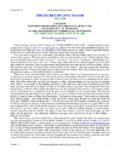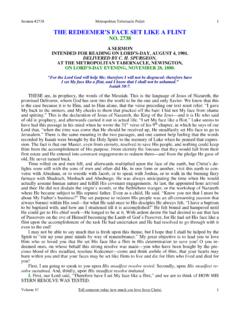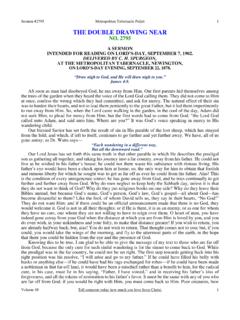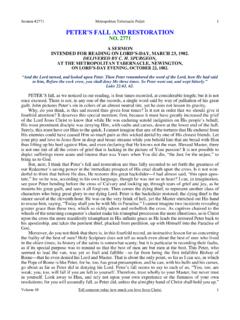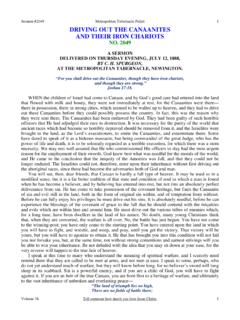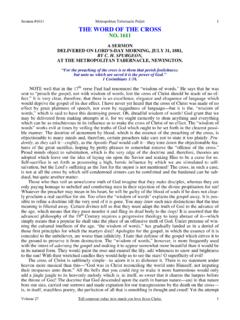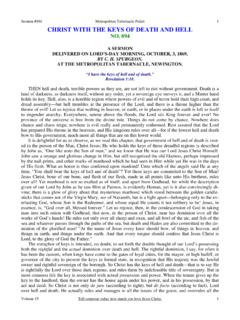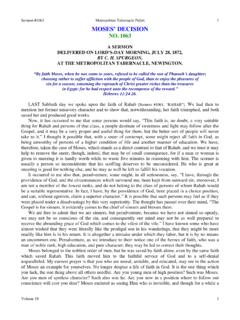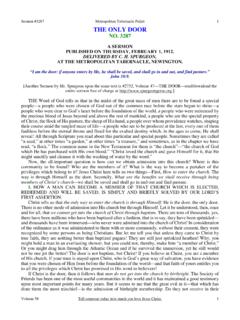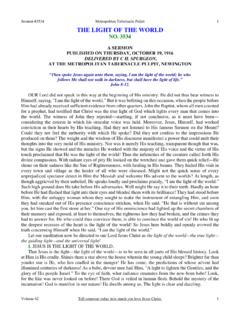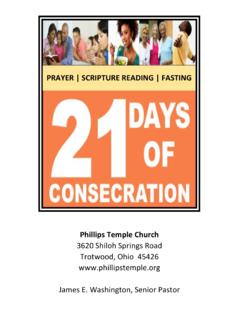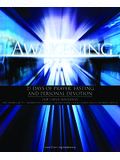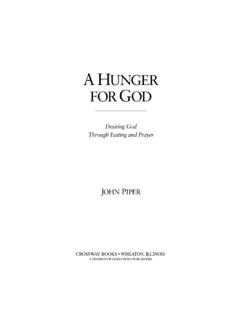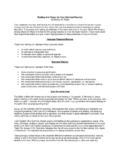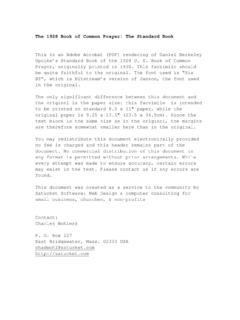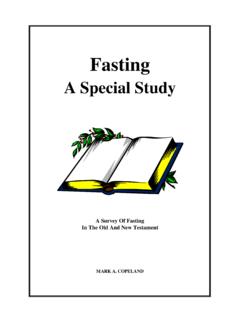Transcription of Sermon #1390 Metropolitan Tabernacle Pulpit 1 ...
1 Sermon #1390 Metropolitan Tabernacle Pulpit 1 Volume 23 1 EXTEMPORANEOUS prayer NO. 1390 A Sermon DELIVERED ON LORD S-DAY EVENING, SEPTEMBER 9, 1877, BY C. H. SPURGEON, AT THE Metropolitan Tabernacle , NEWINGTON. So I prayed to the God of heaven. Nehemiah 2:4. AS we have already seen in the reading of the Scripture, Nehemiah had made inquiry as to the state of the city of Jerusalem, and the tidings he heard caused him bitter grief. Why should not my countenance be sad, he said, when the city, the place of my fathers sepulchers, lies waste, and the gates thereof are consumed with fire? He could not endure that it should be a mere ruinous heap that city which was once beautiful for situation and the joy of the whole earth.
2 Laying the matter to heart, he did not begin to speak to other people about what they would do, nor did he draw up a wonderful scheme about what might be done if so many thousand people joined in the enterprise, but it occurred to him that he would do something himself. This is just the way that practical men start a matter. The unpractical will plan, arrange, and speculate about what may be done, but the genuine, thorough-going lover of Zion puts this question to himself What can you do? Nehemiah, what can you do yourself? Come, it has to be done, and you are the man that is to do it at least, to do your share. What can you do? Coming so far, he resolved to set apart a time for prayer .
3 He never had it off his mind for nearly four months. Day and night Jerusalem seemed written on his heart, as if the name was painted on his eyeballs. He could only see Jerusalem. When he slept he dreamed about Jerusalem. When he woke, the first thought was Poor Jerusalem! and before he fell asleep again his evening prayer was for the ruined walls of Jerusalem. The man of one thing, you know, is a terrible man, and when one single passion has absorbed the whole of his manhood something will be sure to come of it. Depend upon that. The desire of his heart will develop into some open demonstration, especially if he talks the matter over with God in prayer .
4 Something did come of this. Before long, Nehemiah had an opportunity. Men of God, if you want to serve God and cannot find the propitious occasion, wait awhile in prayer and your opportunity will break on your path like a sunbeam. There was never a true and valiant heart that failed to find a fitting sphere somewhere or other in His service. Every diligent laborer is needed in some part of His vineyard. You may have to linger, you may seem as if you stood in the market idle, because the Master would not engage you, but wait there in prayer and with your heart boiling over with a warm purpose, and your chance will come. The hour will need its man, and if you are ready, you, as a man, shall not be without your hour.
5 God sent Nehemiah an opportunity. That opportunity came, tis true, in a way which he could not have expected. It came through his own sadness of heart. This matter preyed upon his mind till he began to look exceedingly unhappy. I cannot tell whether others remarked it, but the king whom he served, when he went into court with the royal goblet, noticed the distress on the cupbearer s countenance, and said to him, Why is your countenance sad, seeing you are not sick? This is nothing else but sorrow of heart. Nehemiah little knew that his prayer was making the occasion for him. The prayer was registering itself upon his face. His fasting was making its marks upon his visage, and though he did not know it, he was, in that way, preparing the opportunity for himself when he went in before the king.
6 But you see when the opportunity did come there was trouble with it, for he says, I was very sore afraid. Extemporaneous prayer Sermon #1390 Volume 23 2 2 You want to serve God, young man, you want to be at work. Perhaps you do not know what that work involves. It is not all pleasure. You are longing for the battle, young soldier, you have not smelled powder yet, and when you have been in a battle and have had a few cuts, or a bullet or two have pierced you, you may not feel quite so eager for the fray. Yet the courageous man sets those things aside, and is ready to serve his country or his sovereign, and so the courageous Christian puts all difficulty aside, and he is ready to serve his comrades and his God, cost what it may.
7 What if I should be sore afraid? Yet so let it be, my God, if thus there shall be an opportunity to seek and to secure the welfare of Jerusalem for Your servant, who longs to promote it with all his heart. Thus have we traced Nehemiah up to the particular point where our text concerns him. The king, Artaxerxes, having asked him why he was sad, he had an opportunity of telling him that the city of his fathers was a ruin. Thereupon the king asks him what he really wishes, by the manner of the question he would seem to imply an assurance that he means to help him. And here we are somewhat surprised to find that, instead of promptly answering the king the answer is not given immediately an incident occurs, a fact is related.
8 Though he was a man who had lately given himself up to prayer and fasting, this little parenthesis occurs So I prayed to the God of heaven. My preamble leads up to this parenthesis. Upon this prayer I propose to preach. Three thoughts occur to me here, on each of which I intend to enlarge the fact that Nehemiah did pray just then, the manner of his prayer , and, the excellent kind of prayer he used. I. THE FACT THAT NEHEMIAH PRAYED CHALLENGES ATTENTION. He had been asked a question by his sovereign. The proper thing you would suppose was to answer it. Not so. Before he answered he prayed to the God of heaven. I do not suppose the king noticed the pause.
9 Probably the interval was not long enough to be noticed, but it was long enough for God to notice it long enough for Nehemiah to have sought and have obtained guidance from God as to how to frame his answer to the king. Are you not surprised to find a man of God having time to pray to God between a question and an answer? Yet Nehemiah found that time. We are the more astonished at his praying because he was so evidently perturbed in mind, for, according to the second verse, he was very sore afraid. When you are fluttered and put out you may forget to pray. Do you not, some of you, account it a valid excuse for omitting your ordinary devotion? At least, if anyone had said to you, You did not pray when you were about that business, you would have replied, How could I?
10 There was a question that I was obliged to answer. I dared not hesitate. It was a king that asked it. I was in a state of confusion. I really was so distressed and terrified that I was not master of my own emotions. I hardly knew what I did. If I did not pray, surely the omission may be overlooked. I was in a state of wild alarm. Nehemiah, however, felt that if he was alarmed it was a reason for praying, not for forgetting to pray. So habitually was he in communion with God that as soon as he found himself in a dilemma he flew away to God, just as the dove would fly to hide herself in the clefts of the rock. His prayer was the more remarkable on this occasion, because he must have felt very eager about his object.
